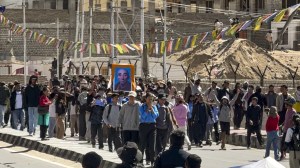Reddy finds similarity between his Broadcast Bill, Sushma’s DTH policy
NEW DELHI, NOV 7: The Broadcast Bill introduced in the summer of 1997 by then United Front Government, and the DTH provisions announced re...

NEW DELHI, NOV 7: The Broadcast Bill introduced in the summer of 1997 by then United Front Government, and the DTH provisions announced recently by Information and Broadcasting Minister Sushma Swaraj, bear striking resemblance. And if there is one man who cannot help chuckling and expressing concern at the Government’s attempts to regulate media through piecemeal legislations such as this, reminiscent of his attempts, it is former Information and Broadcasting minister Jaipal Reddy. “We had worked out a comprehensive Bill, which I chose to address as a Provisional Bill, after members of a joint select committee had reached a consensus,” said Reddy. The 49 per cent cap on foreign equity in DTH, with an additional clause now, was in place three years ago. The eligibility criterion for Indian and foreign companies, to render them elgible for DTH licences too were envisaged in the Bill.
On inter-media restrictions (a cap on newspaper barons from entering electronic media and intra-media restrictions were hinted at in the Bill), while Swaraj speaks of a convergence authority, Jaipal spoke of a broadcast authority to regulate the media business on the other. “There is no convergence authority anywhere in the world,” Reddy points out.
Swaraj, of course, brooks no dissent in policy matters. So violators of terms and conditions will have to pay Rs 50 crore as penalty. Reddy had imposed a fine of Rs 50 lakh. Lastly, both the ministers have provided adequate provisions to prevent monopolies in the future. So what’s new?
After introducing the Broadcast Bill three years ago with the sole purpose of freeing media from Government’s clutches and the I&B Ministry from the minister’s hold, Reddy can’t help pointing out the similarities his Bill bears to Swaraj’s DTH policy.
While concerned media persons worry at the undue haste in which Swaraj opened the skies, albeit with reasonable restrictions, for DTH on Ku-band, Reddy wonders at the delay in arriving at a decision — specially when the provisions envisaged in the DTH policy bear all-too familiar resemblance to his Bill.
If during Jaipal’s short tenure as I&B minister, members from all political parties (Swaraj included) travelled all around the country for six months to craft an exhaustive piece of legislation on media, the BJP-led Government, on its part, constituted a Group of Ministers (GoM) on January 31, 2000 by reconstituting the January 22, 1999 GoM. “Why the delay by a minister who has spent a considerably longer time in the Ministry than I have?” asks Reddy.
Lastly, on his pet subject — Prasar Bharati Corporation — notified by the United Front Government through an Act, the former minister points out that if Swaraj wanted to rid the Corporation of an all-too-powerful CEO, the current CEO/Special Secretary has never been more powerful than his predecessors. Why not have him formally appointed as CEO by a select committee, asks Reddy.
Swaraj is carefully looking into the recommendations of the Shunu Sen Committee and will spell out her decision. If her decision looks like Reddy’s, then they don’t have to fight it out in Lok Sabha in the Winter session.





- 01
- 02
- 03
- 04
- 05


























